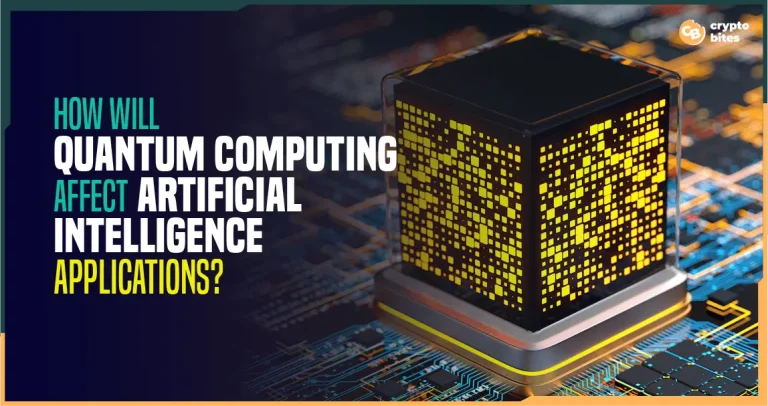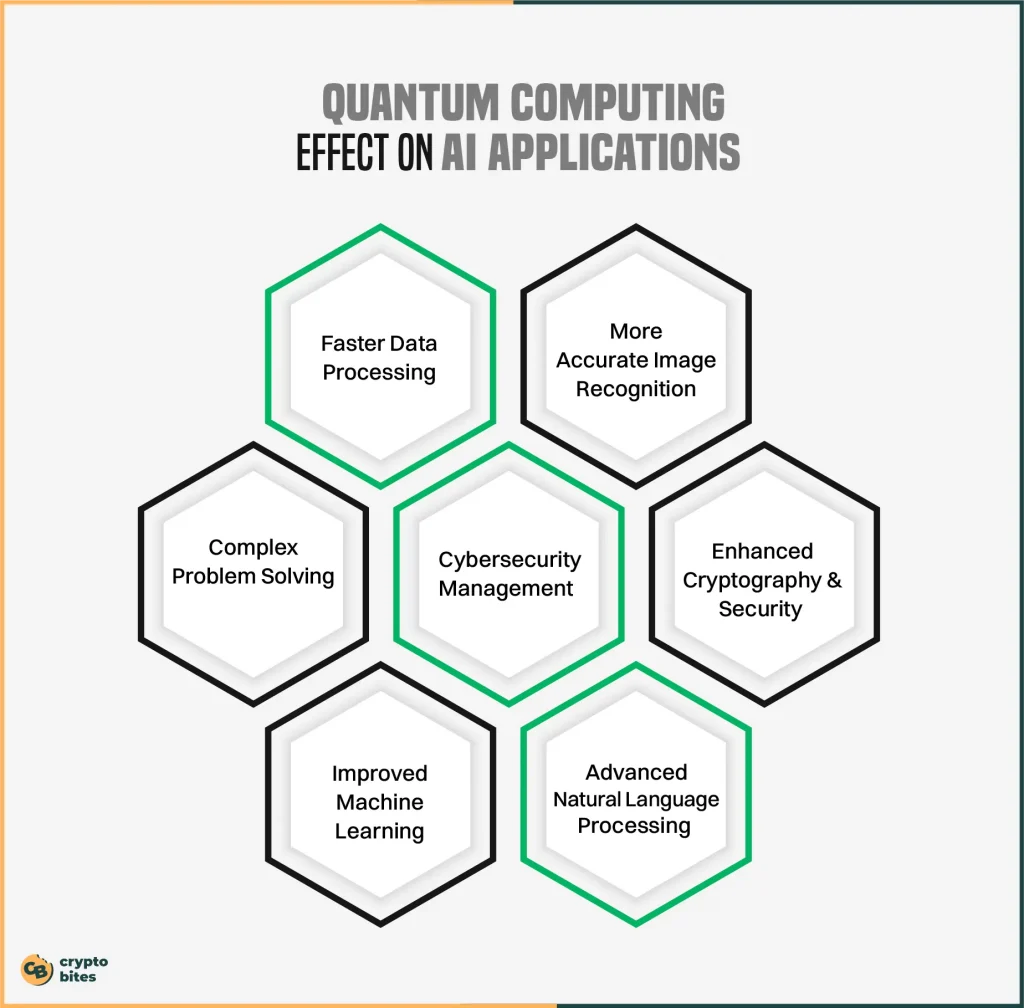
How Will Quantum Computing Affect Artificial Intelligence Applications?
Let’s face it. AI is the new superpower in this current sci-fi landscape and we cannot do without it in any aspect of life.
But can our traditional computing system leverage the true potential of AI?
The answer is no, giving birth to the concept of quantum computing, a more advanced computational technique to redefine the digital realm.
But how will quantum computing affect artificial intelligence applications?
With millions of times faster processing power than classic computing, quantum computing is all set to revolutionize AI’s performance with enhanced speed, accuracy, and efficiency.
Consequently, several tech giants like Microsoft, Google, and Intel are actively trying to develop quantum computing tools, to capitalize on its myriad benefits.
No wonder why its global market size is projected to reach $5.3 billion by 2029. (source)
Wish to learn more in this regard? Stay tuned till the end!
Exploring the Basics: What Is Quantum Computing and How Does It Work?
Quantum computing is a technology based on quantum mechanics, relying on quantum bits or qubits.
In classic computing, data is encoded through binary bits, which is either 0 or 1. This is where quantum computing emerges as the game changer by representing both 0 and 1 at a time with qubits.
As a result, it can take care of complex calculations much quicker than conventional computing.
However, quantum computing relies on the following two core principles-
1. Superposition
As opposed to classical bits, which are strictly binary, qubits exist in multiple states simultaneously. And this principle is known as superposition, the core concept of quantum computing.
As superposition allows qubits to be in states 0 and 1 at the same time, quantum computers can perform parallel computations and thus solve complex calculations way faster.
2. Entanglement
Another key characteristic of quantum computing is entanglement which ensures the correlation among qubits, even when they are physically separated by a large distance.
Due to entanglement, each state of qubits is interconnected to each other, making it possible to measure one qubit and get an idea of others.
Thus, entanglement helps quantum computers process a sea of data unfailingly.
Quantum Effect on AI: How Will Quantum Computing Affect Artificial Intelligence Applications?
As I discussed above, quantum computing can significantly enhance the speed, efficacy, and accuracy of AI algorithms.
Thus it affects every aspect of Artificial Intelligence in the following way:
1. Faster Data Processing
Think about blockchain, the distributed ledger technology behind cryptocurrency exchange.
As this framework runs through peer-to-peer networking, it needs unparalleled computational power to process larger chunks of data simultaneously.
In this scenario, quantum computing, without a doubt, is the most reliable working force for processing data faster than ever.
By performing different calculations parallelly, it can accelerate the computation process, resulting in analyzing and tackling massive datasets in real time.
Thus it can optimize AI performance in real-world use cases, such as traffic management, healthcare, drug discovery, etc.
2. Complex Problem Solving
AI is all about managing complex algorithms, and quantum computing can surely enhance its performance by solving the algorithms efficiently.
But how?
Unlike classical computers, which follow a linear problem-solving approach, quantum computing runs on a non-linear mechanism.
Quantum particles like qubits exist in multiple states simultaneously, and therefore, identify and solve complex problems in a way that is beyond the limit of classical computers.
For instance, it can break complex encrypted codes, simulate different chemical reactions, allocate resources for several entangled systems, etc.
Thus quantum algorithms heavily influence AI applications in every sector, research and discovery of new drugs, for example, solving real-world problems more effectively.
3. Improved Machine Learning
Quantum computing can notably boost the machine learning process with its unprecedented computational power.
As AI learns from larger datasets using machine learning, the faster the process, the more efficient AI is.
And it wouldn’t be an exaggeration to address quantum algorithms as the heart of machine learning.
Whether it’s about creating/identifying patterns, processing high-dimensional data, or quick decision-making, quantum computing revolutionizes everything by speeding up algorithm optimization and search procedures.
It also makes sure that high-quality, authentic data is available to train AI, not to restrict the machine learning process.
Take the Covid-19 pandemic for example. To research such a newly identified virus, AI must need the right amount of information within a short period.
And quantum computing can accelerate the machine learning process by making a substantial volume of Covid-19 data available for AI.
4. Advanced Natural Language Processing
In this AI realm, everybody is familiar with AI chatbots like ChatGPT, Jasper, Replika, etc.
However, advancements in natural language processing (NLP) enable these chatbots to understand and generate human language better.
Thankfully, quantum computing has all the potential, not only to develop a more powerful NLP system but also to improve the accuracy of language translation, sentiment analysis, text analysis, and semantic understanding.
After October 2021, when Cambridge Quantum Computing (now part of Quantinuum) released the first quantum natural language processing toolkit and library, it became easier to develop applications such as text mining, text-to-speech, language translation, automated dialogue, etc.
This development of QNLP will definitely benefit AI programs in automatic language translation, therefore improving communication.
5. Enhanced Cryptography and Security
In terms of cryptography and security, there are two opposite views regarding quantum computing.
On one hand, it makes unauthorized access to confidential data harder than classic computers, making data more secure.
Think of cryptocurrency security for instance. Here, you must rely on a system that protects digital assets such as Bitcoin, Ethereum, etc. from hackers.
You can, therefore, create secret codes by using quantum mechanisms to protect their underlying ledger, the blockchain.
Similarly, quantum algorithms are equally useful for critical AI systems, where sensitive data security is a must.
On the other hand, hackers can harness the full potential of quantum mechanics by calculating all the possible ways of data breach.
However, quantum computing can battle the challenge if it introduces new quantum-resistant encryption methods soon.
6. More Accurate Image Recognition
AI, these days, has reached far beyond our imagination by taking technological inventions to the next level.
As a result, unfailing image recognition is no longer a choice, but a necessity to leverage several AI applications, medical imaging, self-driving vehicles, etc. to name a few.
Fortunately, quantum computers came to the scenario to take charge of accurate image identification, leading to hassle-free AI domination in the broader spectrum.

7. Cybersecurity Management
As discussed earlier, quantum computing itself poses the risk of security breaches in the digital landscape.
Then how on earth can you use it to boost cybersecurity defense?
The answer lies in AI.
When quantum computing is integrated into AI applications, you can utilize AI to analyze and break digital codes, resulting in discovering a more secure pattern to fight against cybersecurity threats.
So, this symbiotic relationship between AI and quantum algorithms is surely a big thing in this quantum era.
Limitations and Future Challenges of Quantum Computing
Aside from being a transformative force to maximize AI operations, quantum computing comes with a few limitations as well.
Here are the major drawbacks that need to be addressed immediately:
- So far, it’s so expensive. Without a hefty budget, businesses and organizations cannot afford the setup and maintenance of quantum computing.
- Quantum computers are excessively noise-sensitive. It makes them hard to operate.
- Plus, you need to feed them accurate data in their accepted format. Otherwise, there will be errors that are pretty time-consuming to correct.
- Then there is ethical concern regarding the fair use of quantum mechanisms. Quantum-powered AI applications can crack even the toughest encryptions. So, it must be used responsibly.
- Finally, we need a lot of skilled quantum programming talents to take this driving force forward and shape the future.
Let’s Prepare for a Quantum-Driven Future
As we navigate through the emerging era of Web 3, there’s no alternative to depend on quantum-powered AI. Therefore, we should be ready to embrace this new fusion positively.
Of course, there are challenges and there will be. However, as both technologies are still maturing, an interdisciplinary approach can increase their potential.
Particularly, quantum computing can revolutionize AI applications in different sectors with its unprecedented computational power.
So, let’s embark on this quantum leap together where it unlocks the true potential of AI, creating a brighter tomorrow.
FAQ
1. How quantum computers are different from classical computers?
Quantum computers are fundamentally different from classical computers as they don’t use binary bits (either 0 or 1) to store or process information.
Rather they encode data through quantum bits or qubits, representing both 0 and 1 simultaneously, making them millions of times faster than conventional computers.
2. What will happen when quantum computers are tied with AI?
When quantum computing is integrated with AI, it will revolutionize the computational speed and capabilities by leveraging quantum bits or qubits. Therefore, AI operations like machine learning, pattern recognition, complex optimization, etc. will be exponentially accelerated.
3. What is meant by applied quantum computing?
Applied quantum computing refers to using this groundbreaking technology to solve real-world problems across different industries. Implementing quantum computing algorithms for task optimization, machine learning, finance modeling, drug discovery, etc. involves applied quantum computing.




